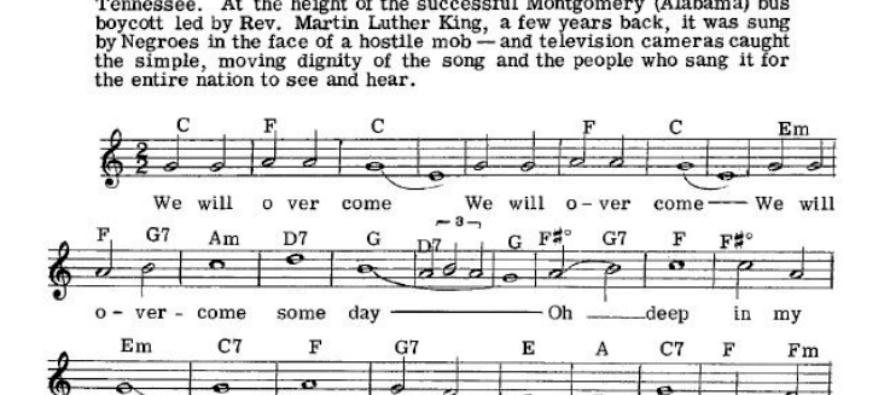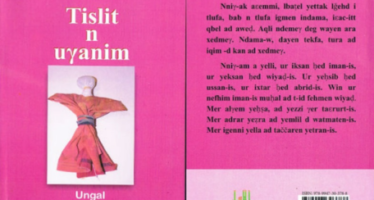“We Shall Overcome”. Pete Seeger on What Would Have Been His 100th Birthday

![]()
It was 100 years ago, May 3, that the late folk singer and activist Pete Seeger was born. In 2004, Seeger came into the Democracy Now! Firehouse studio for an in-depth interview. We play an excerpt to mark his centennial celebration, in which he recalls how he learned about the classic civil rights anthem “We Shall Overcome,” that he helped to popularize. Watch the full interview and Democracy Now’s full archive of interviews with Seeger.
Transcript
AMY GOODMAN: We end today’s show with the words of the late folk singer and activist Pete Seeger. He was born a hundred years ago today. In 2004, Pete Seeger came into our Firehouse studio.
AMY GOODMAN: Pete Seeger, can you tell us about “We Shall Overcome”?
PETE SEEGER: I thought, in 1946, when I learned it from a white woman who taught in a union labor school, the Highlander Folk School in Tennessee, that the song had been made up in 1946 by tobacco workers, because they sang it there to strike through the winter of 1946 in Charleston, South Carolina, and they taught the song to Zilphia Horton, the teacher at the labor school. And she said, “Oh, it was my favorite song.” And I printed it in our little magazine in New York, People’s Songs, as “We Will Overcome” in 1947.
It was a friend of mine, Guy Carawan, who made it famous. He picked up my way of singing it, “We Shall Overcome,” although Septima—there was another teacher there, Septima Clark, a black woman. She felt that “shall”—like me, she felt it opened up the mouth better than “will,” so that’s the way she sang it. Anyway, Guy Carawan in 1960 taught it to the young people at the founding convention of SNCC, Student Nonviolent Coordinating Committee, SNCC for short. And a month later, it wasn’t a song, it was the song, throughout the South.
AMY GOODMAN: You sang it for Martin Luther King?
PETE SEEGER: In 1957, I went down to Highlander. Zilphia was dead, and Myles Horton, her husband, said, “We can’t have a celebration of 25 years with this school without music. Won’t you come down and help lead some songs?” So I went down, and Dr. King and Reverend Abernathy came up from Alabama to say a few words, and I sang a few songs, and that was one of them. Anne Braden drove King to a speaking engagement in Kentucky the next day, and she remembers him sitting in the back seat, saying, “’We Shall Overcome.’ That song really sticks with you, doesn’t it?” But he wasn’t the song leader. It wasn’t until another three years that Guy Carawan made it famous.
AMY GOODMAN: The late folk singer and activist Pete Seeger speaking in 2004. He was born 100 years ago today. You can watch that full interview and all of our interviews with Pete Seeger on our website at democracynow.org.
The original content of this program is licensed under a Creative Commons Attribution-Noncommercial-No Derivative Works 3.0 United States License. Please attribute legal copies of this work to democracynow.org. Some of the work(s) that this program incorporates, however, may be separately licensed. For further information or additional permissions, contact https://www.democracynow.org
Source: Democracy Now!
Image: The song as published in the April–May 1961 edition of Pete Seeger’s folk music magazine Sing Out! The words are the same as the 1948 People’s Songs version, except that it uses “deep” instead of “down.”
Based on Negro spiritual hymn, traditional [Public domain]
Links
Pete Seeger, We Shall Overcome (Version #02), Berlin, DDR (GDR), 1967
Related Articles
‘The Bride of Reeds’ and Tamazight Literature’s from Oral to Written
![]()
Rachid Bouxerroub was the inaugural winner of the Assia Djebar fiction prize in the Tamazight category
Los Rolling Stones en La Habana
![]()
Los Rolling Stones, una de las más célebres agrupaciones del rock mundial, se encuentran en estos momentos en Brasil, donde se preparan para dar su segundo concierto en Sao Pualo este sábado 27 de febrero
Maryam Saleh: The Raw Voice of Revolution
![]()
Maryam will be singing her own original songs, now fully developed in terms of music, expression, and even politics.




